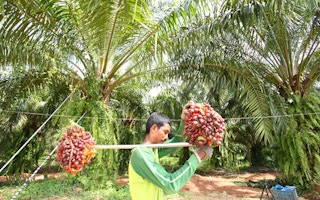The Malaysian Palm Oil Association (MPOA), which represents the private plantation companies, will decide at its council and exco meeting this Friday whether to quit the Roundtable on Sustainable Palm Oil (RSPO) grouping.
At the same time, the RSPO, fed up with the MPOA stalling on the implementation of measures that would facilitate sustainable planting, has given the Malaysian body an ultimatum to consider its position in the international multi-stakeholder organisation.
The RSPO is a non-profit organisation issuing the certificate that validates that the production of palm oil is sustainable. The RSPO certificate is crucial for plantations to export their products to European and other Western countries.
Industry officials said that of late, there had been a stalemate in negotiations between the RSPO and Malaysian oil palm growers on a host of contentious issues.
“Chief among them is the compensation imposed on planters for being unable to meet the RSPO requirements on high carbon stock, palm oil mill effluents and greenhouse gas emissions,” said an industry official.
“
Should the MPOA, as the umbrella body of all plantations in the country, quit the RSPO, then it would be joining many of its counterparts from emerging economies. However, the individual planters may continue to be a part of the RSPO on their own accord
The MPOA has recommended to its 17 council and exco members that include plantation big boys such as Sime Darby Bhd, IOI Corp Bhd, Kuala Lumpur Kepong Bhd, United Plantations Bhd, Felda Global Ventures Holdings Bhd as well as mid-tiered plantation companies and independent small estate owners, to do away with the RSPO.
“Now is the time that requires the wisdom of the MPOA council and exco members to make a decision on whether to quit the RSPO or continue to be a part of it,” the official told StarBiz, adding that at least two local plantation companies had agreed to exit the RSPO.
Should the MPOA, as the umbrella body of all plantations in the country, quit the RSPO, then it would be joining many of its counterparts from emerging economies. However, the individual planters may continue to be a part of the RSPO on their own accord.
For instance, Sime Darby, which is one of the largest plantation groups in the country, can continue to be a part of the RSPO to effectively penetrate the European market even if the MPOA opts out of the organisation.
In September 2011, Gabungan Pekebun Kecil Indonesia (GAPKI), the MPOA’s Indonesian counterpart, quit the group.
GAPKI’s rationale then was quite straightforward. It felt that for all the efforts and costs incurred by planters to comply with the RSPO requirements, their exports of crude palm oil (CPO) had failed to fetch a premium and secure a good uptake.
Both Malaysia and Indonesia account for over 80 per cent of CPO production globally.
According to sources, the RSPO is turning out to be “not the right organisation” for the MPOA; one that can act fairly to enable oil palm growers to pursue and embrace the principle of sustainability in the production of palm oil.
They pointed out that MPOA members should support and work closely to build the national certification standard, the Malaysian Sustainable Palm Oil (MSPO), which is expected to be “officially” launched by the end of next month.
Some planters also claimed the governance and aspirations of the RSPO had changed, whereby the increasing involvement of NGOs such as World Wildlife Fund (WWF)-linked individuals and Western green activists had been found at all levels of the RSPO task force, committees and organisational set-ups.
“Now the RSPO is as good as the Trojan Horse of the WWF,” said a member of the MPOA, adding that the oil palm growers who had previously formed the majority of the RSPO have now become the minorities.
“Any objection put up by the oil palm growers’ grouping is no longer sustained but scuttled by the voting majority of the RSPO members from among the NGOs and green activists during most of the annual general meetings.”
Some industry observers opined that the potential exit from the RSPO by the MPOA also comes hot on the heels of the Unilever-Wilmar group’s trade alliance compelling the Sarawak Oil Palm Plantation Owners Association to give an undertaking that there would be “No deforestation, no peat and no exploitation” by the planters.
“The vertical arrangement between Unilever and Wilmar upon oil palm growers in the peat land areas in Sarawak is pre-emptive and unilateral. It is important that this trade overture might either compromise or infringe the Competition Act 712 and/or 713.”
It is said that a group of consultants and plantation experts from Wilmar are currently on a two-day visit to Sibu and Miri to clarify on its new CPO sourcing policy to the affected Sarawak planters and smallholders via the Felda and Sarawak Land Consolidation and Rehabilitation Authority schemes.

















